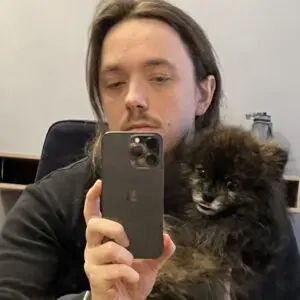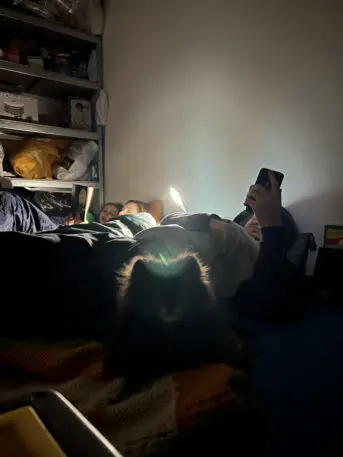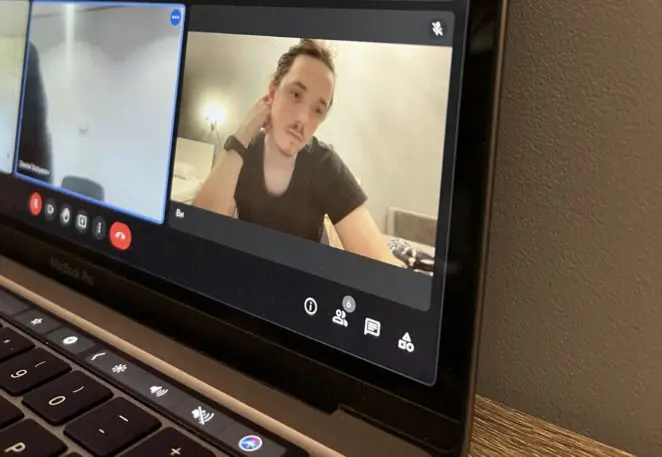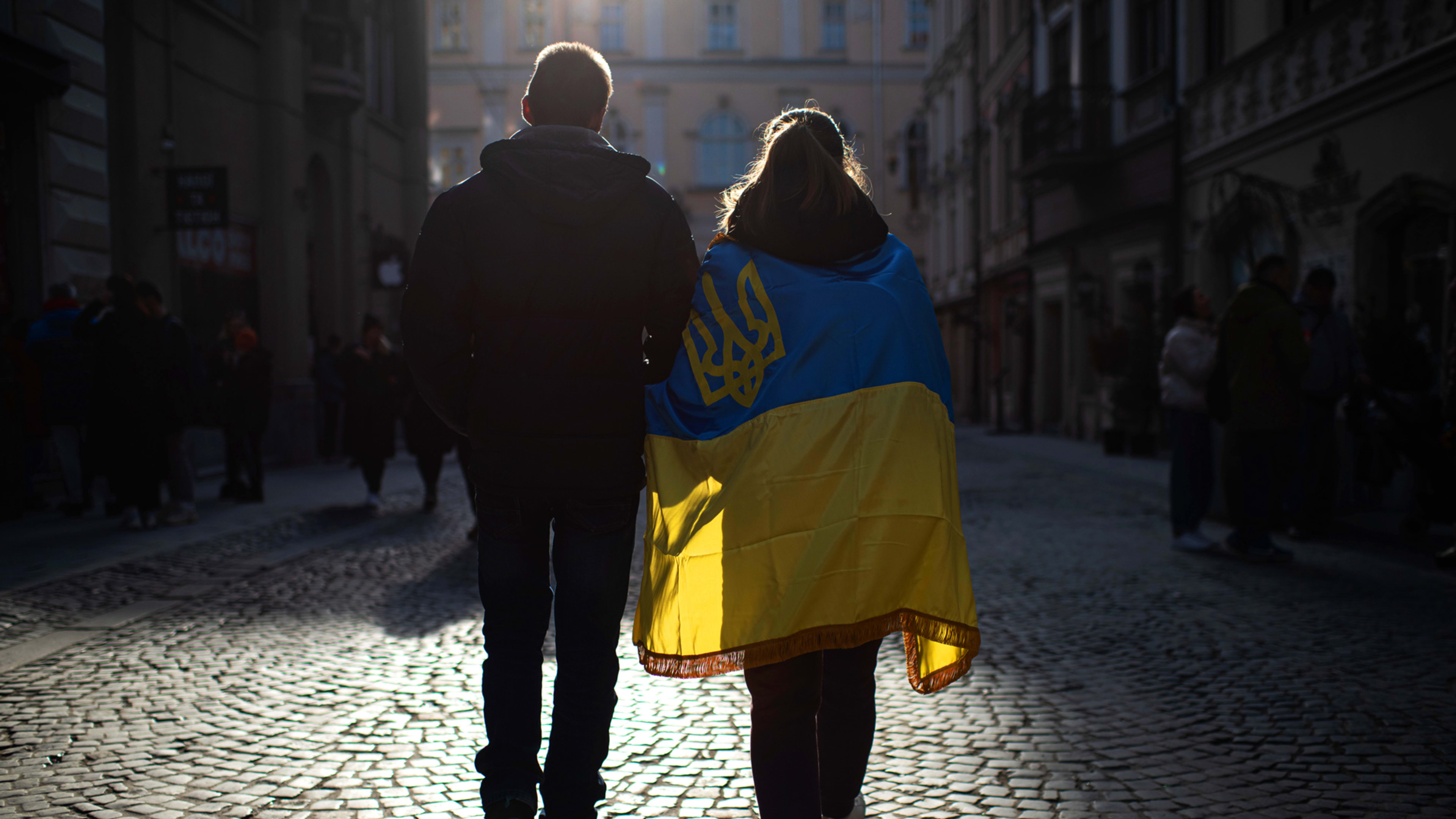Since late February, Fast Company has covered the vibrant technology space that’s endured in Ukraine, even as the country has been embroiled in war against Russia. The Ukrainian tech community has played an outsize role in both countering the Russian advance and rallying the world’s support for the Ukraine’s plight.
Petcube, which makes connected pet cameras, is an example of that spirit. Talking with us in early June, the company’s cofounder and CMO Andrey Klen spoke candidly about his own experience over the previous few months, and shed some light on what it’s like running his business amid the anxiety and confusion of war.
Here, Klen tells his story in his own words, which we’ve lightly edited for length and clarity.
Where I’m calling from
I’m in Lviv in western Ukraine. That’s one of the big cities, and I’m traveling back to Kyiv tomorrow morning. I was forced to come here—it was sort of an evacuation. It’s been almost four months, and I’m going back home tomorrow. Sometimes, we’re in between places. We can be in San Francisco or Shenzhen in China. But Kyiv is home.
Our company, Petcube, connects pets to the internet. It kind of sounds silly, but it’s true. We sell interactive home cameras for pet “parents” so they can check on their pets remotely from their phone. You can make sure your pet is okay. You can connect with them, so you can hear them and talk to them. You can also see them, and there are some other interactive features. Our main customers are in the U.S.; we’ve already sold half a million devices there. But we’re also selling in Canada, Australia, and in some European countries.
February 24, the war begins
The 24th was kind of crazy. It was a regular day. I woke up with my Tinder date. I got up early in the morning with my phone blowing up, and I had a couple dozen messages that the war had started. We were in shock for quite a while. It was really hard to unpack. It is kind of a surreal experience, something that you cannot believe is happening. It was hard to comprehend. Then I learned that one of the [Soviet] rockets had landed about a mile from me, and basically blew up the whole area. We had slept through that.

When you were outside or looking outside from the window, you’d see people just going about their daily business. But you’d know that a shit-ton of rockets just landed in various cities, and the war had started, and there were troops coming into our territory.
So I packed for my dog. I think I took more of my dog’s belongings than my personal stuff. I found a friend of a friend who was going in the direction of western Ukraine. And we were on this road for about 16 hours in this car with random people I didn’t know.
There were no specific travel plans. I just jumped in a car, and I went. The traffic was awful. The trip to Lviv normally takes about six hours, but it took us maybe [that long] just to leave the city and the Kyiv region. And as I was traveling, I contacted one of my colleagues who was kind enough to provide his home for me. Later I rented my own space.
A shock to the business
Most of our team is still in Ukraine. It was a shock for everybody because we had people in different places all over the map in Ukraine. We had an evacuation plan individually for each of our employees maybe six to eight weeks before everything happened. But up until the last moment, nobody wanted to believe that war would start. When it did, everybody just started moving. And for about a week, it was super hectic. We didn’t have our regular calls, maybe just the most crucial ones. Everybody was basically trying to navigate to a safe place, especially [our employees] from the eastern regions and from the central parts of the country.
There were different situations. You need to understand that men could not leave the country right after the war started because of the mobilization. And some women did not want to break up their families, so they stayed with them. It’s a very common thing. Some families without men needed to relocate, so they basically went to Europe—to Poland, to Germany, or Denmark mostly—and the rest of the team was just moving gradually to the West.

The whole war situation basically influenced our personal human potential. But our operations and our manufacturing and our sales weren’t really touched because we manufacture in China. We’re a distributing team. We’re used to working in the U.S., in Ukraine, and China simultaneously. So, it’s not something that we don’t know how to do. It’s not a big challenge for us to coordinate and synchronize in this condition. So, a week or two after the invasion happened, we were back to normal, working normally.
The only adjustments that were necessary were to people’s morale because everybody was doom-scrolling, and everybody was worrying. Everybody was worrying about their families. Everybody was just basically trying to grasp the idea that another country invaded ours, which is crazy in 2022, and everybody was generally super worried. It’s important to understand that there is no safe place in Ukraine. So any city you’re in, you’re a target, because they’re launching their missiles and ballistic rockets and stuff like that, so you’re constantly in danger. Air raid sirens are going off at least twice a day.
More jobs to do
Constant anxiety, of course, influences your work. It influences your productivity. But on the other hand, people took on more jobs. You have your day job that you need to do in order to get paid and stuff, but then war is really a collective effort. Suddenly, people realize that they have multiple jobs, that they need to volunteer, that they need to make some effort to help the defensive campaigns. They need to jump on a call with U.S. senators in order to lobby for arming our country. Or you find yourself in a situation where you need to come up with a marketing campaign in order to boost interest in bringing in services, or you need to throw a fundraiser, or you need to crowdfund a drone, or you need to educate some people, or you need to ship something somewhere.
But you also need to find medicine for your relative and ship it to them somehow. There [are] tons of work you need to do, as a citizen, as an employee, as a Ukrainian. It’s hard, but we also don’t really have a lot of time to reflect and be scared and be worried because there are so many things to do.

And everybody has this commitment and understanding that it’s okay, that’s how it should be. And business is going to be alright. We’ll get to that at some point, and eventually we did, and now we’re doing good.
Narratives
I’m worried about people dying every day by the hundreds, and that’s something I just can’t really wrap my head around. It’s crazy, it’s absurd, and it should not be happening. That’s people dying. It’s not some remote virtual people dying. It’s people in your Facebook feed. It’s your friends. It’s friends of your friends and their families.
And as every decent human being does, I want it to stop. That’s probably the first expectation, and the most important expectation that we have right now. But I think that some people in the world have a different understanding of how we can stop it. There is a camp that believes that we need to strike a peace deal with an aggressor who already proved themselves to always want more.
Then there is this other more realistic camp that understands clearly that we need to win—that we need to push the Russian military out to the previous borders of the country, the sovereign country, the sovereign state. That would be a solution. In order to do that, we need arms. We need support.
So, the paradox that I’m experiencing is that different countries around the globe have the resources to help us, but they’re either hesitating or they’re struggling with the pro-Russian lobbyists or interests in order to make those shipments of supplies we need to stop hundreds of people dying every day.
That’s what’s really troubling me. It gives me chills, and that’s why I don’t sleep at night really. Insomnia is crazy these days. It’s hard when you have the air raid sirens as many times they just go off in the night hours. So you can’t really catch a good night’s sleep. I’m sleeping probably four hours a day if nothing bad is going on.
There was this little stretch for seven days in the western Ukraine where there was not a single air raid siren. During that period, we went to the Carpathian mountains for a couple of days. That was three or four nights that I fully slept. And that was amazing. I loved it.
False dawn
Honestly, there was another reason for us to go because around the 9th of May, which is known in Russia as Victory Day, there was a lot of talk about Russians actually doing a nuclear strike. So, we thought that going up further from a big city probably would be a good idea. So, we did. And I had a crazy experience on my first night at the mountains. There were railway tracks in very close proximity to my home in the Carpathians—maybe 50 yards from my window. And I was really amped up with this nuclear threat. I was super, super anxious. So, I went to sleep. And at four in the morning I was awoken by a huge loud noise of something exploding. I was sleeping, of course, so maybe some of that in my perception was exaggerated. But there was a freaking loud noise. And then when I looked out the window, the sky was kind of a funny color. It was colored in different tints of blue and yellow and violet. Then this picture combined with this huge abrupt noise; for three seconds it got me thinking, Okay, I’m done. That’s it. That’s the explosion, and that’s it.
I don’t ever want to get to another point in my life where I have to experience that.
Recognize your brand’s excellence by applying to this year’s Brands That Matter Awards before the early-rate deadline, May 3.
